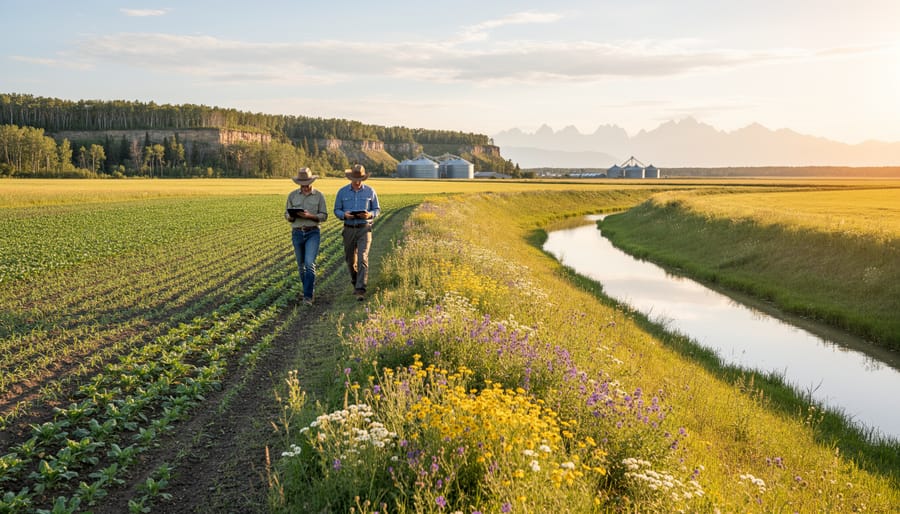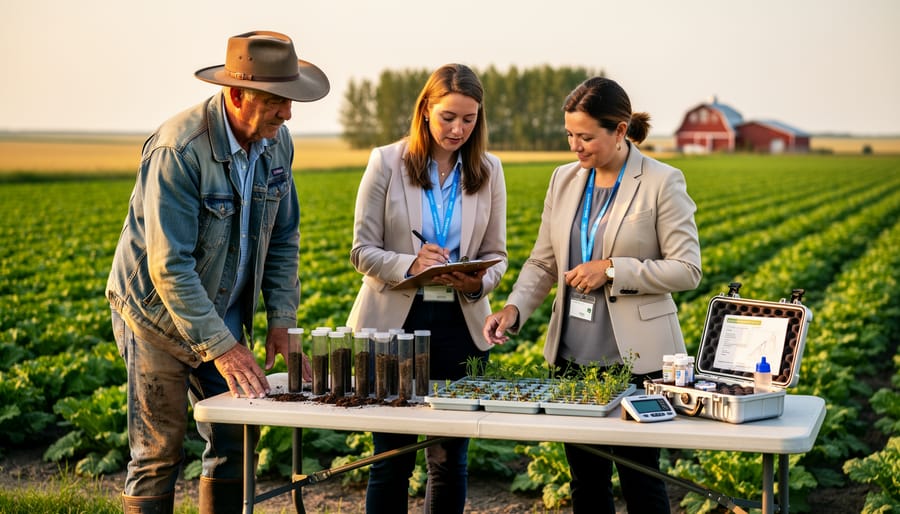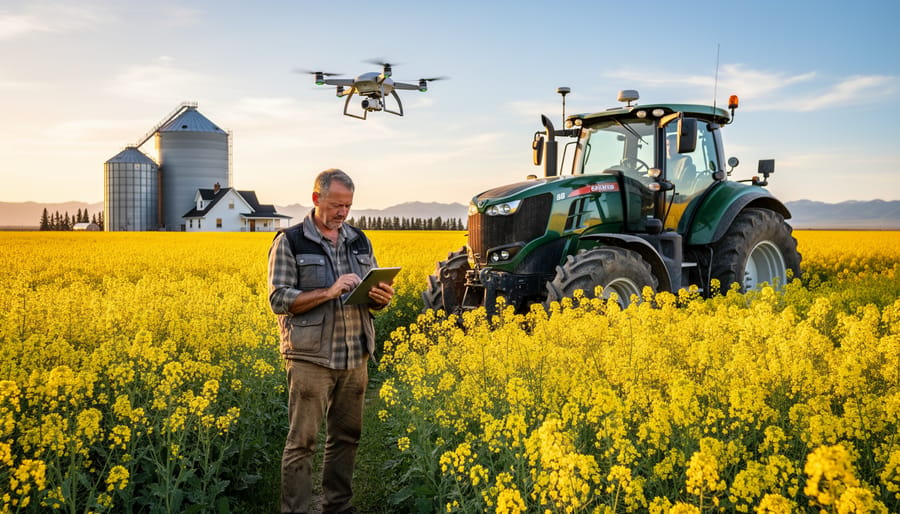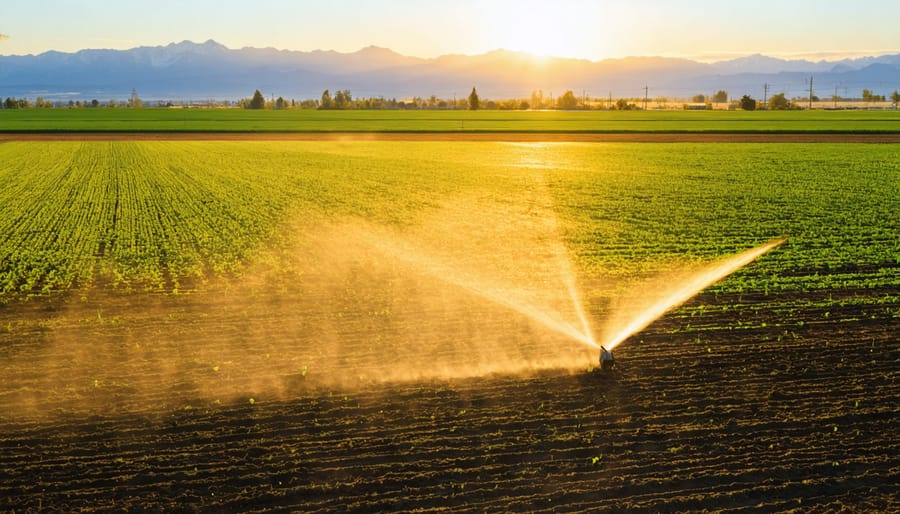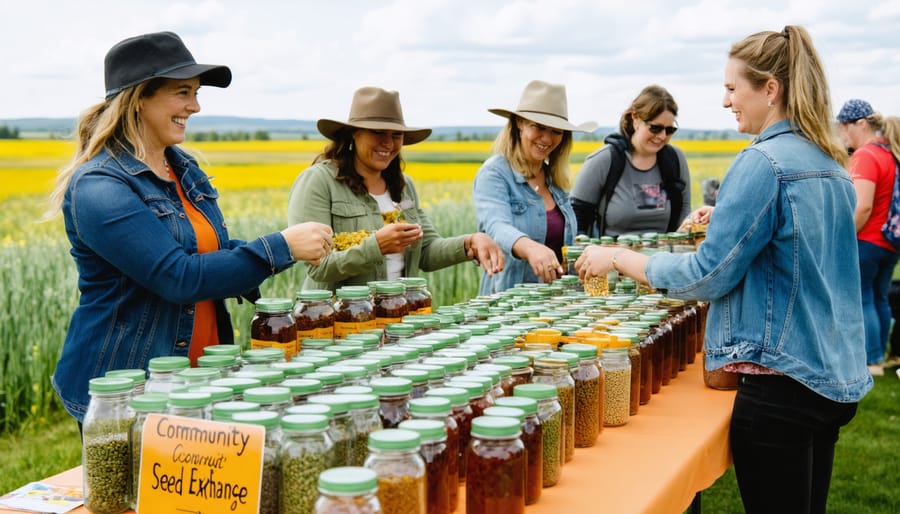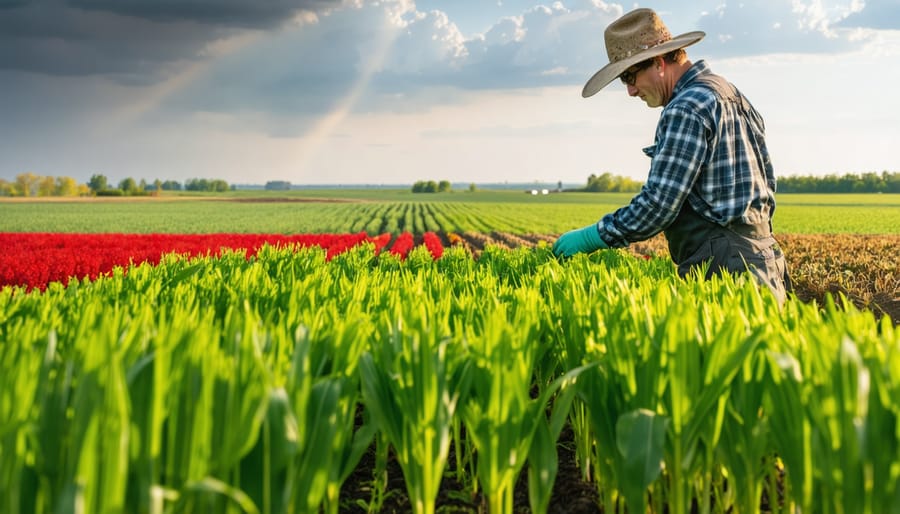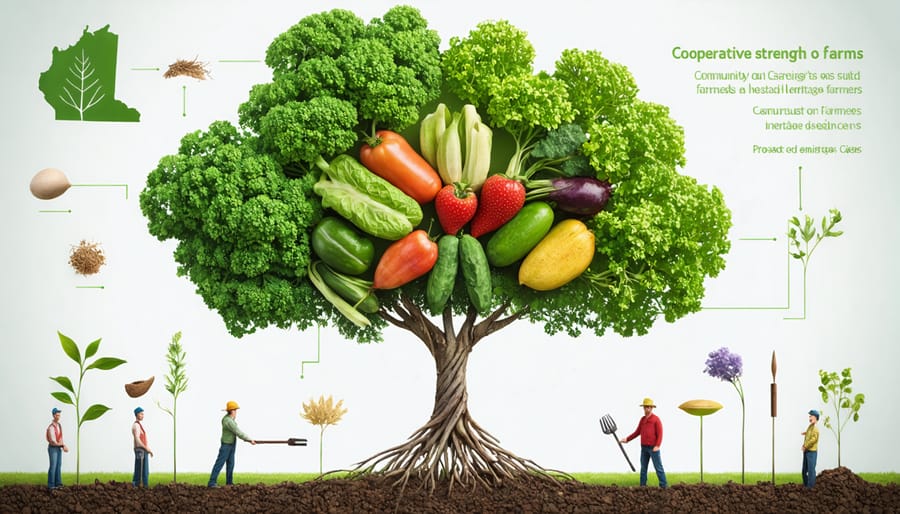Building collaborative farm teams starts with establishing clear communication channels between field workers, managers, and support staff. In today’s rapidly evolving agricultural landscape, where thriving organic communities depend on strong teamwork, effective collaboration has become essential for farm success. Daily huddles, shared digital tools, and structured feedback systems create the foundation for high-performing agricultural teams.
Experience across Alberta’s organic farms shows that teams flourish when members understand both their individual roles and their contribution to the larger operation. Cross-training workers across different areas of production, establishing mentor-mentee relationships, and implementing regular skill-sharing sessions build resilience and adaptability. These practices not only improve operational efficiency but also strengthen community bonds within the farming operation.
Modern agricultural success demands more than just technical expertise – it requires people working together seamlessly across planting, harvesting, and distribution phases. This guide presents eight field-tested strategies that have helped Canadian farms transform disconnected workers into cohesive, productive teams ready to tackle the challenges of sustainable agriculture.
Establishing Clear Communication Channels
Digital Tools for Farm Communication
Modern farm communication has evolved beyond the traditional two-way radio. Apps like WhatsApp and Slack enable instant team messaging and file sharing, perfect for coordinating daily tasks and sharing weather updates. For field operations, try farm-specific tools like Farm At Hand or AgriMap, which help track equipment locations and worker schedules in real-time.
Cloud-based platforms like Google Workspace allow teams to collaborate on documents, spreadsheets, and calendars from any device. This proves invaluable during busy seasons when team members are spread across different fields or locations. For safety and emergency communication, consider implementing apps like Farm Safety Plan, which provides quick access to emergency procedures and contact information.
Many Alberta farmers have found success using team management platforms like Trello or Asana to organize tasks and projects. These tools help visualize workflow, assign responsibilities, and track progress – especially useful during seeding and harvest seasons when coordination is crucial.
Remember to choose tools that work well with limited rural internet connectivity and offer offline functionality when needed.

Regular Team Check-ins
Regular check-ins are the heartbeat of a successful farm operation. Here in Alberta, we’ve seen how scheduled team meetings can transform productivity, especially during peak seasons like seeding and harvest. Consider setting up daily morning huddles during busy periods – these quick 15-minute gatherings can help align everyone’s tasks and address immediate concerns before the day begins.
Weekly team meetings should be more structured, ideally lasting 45-60 minutes. Include updates on crop conditions, equipment maintenance, and upcoming weather forecasts. Many successful organic farms in our region use a round-table format where each team member shares their achievements and challenges from the past week.
Monthly reviews are perfect for bigger-picture discussions about soil health, certification requirements, and seasonal planning. Use these sessions to celebrate team wins and address any ongoing issues. Remember to keep meetings focused and respect everyone’s time – our farming community values efficiency, and well-run meetings demonstrate good stewardship of our most precious resource: time.
Defining Roles and Responsibilities
Task Management Systems
Implementing a clear task management system is crucial for any successful farming operation. Consider using digital tools like farm management software to track daily tasks, assign responsibilities, and monitor progress. Many Alberta farmers have found success with apps that allow team members to update task status in real-time, even when working across different fields or facilities.
Create a centralized dashboard where team members can view their assignments, deadlines, and project priorities. This could be as simple as a shared calendar or as comprehensive as a dedicated project management platform. For example, the Thompson Family Farm in Lacombe uses a digital task board that allows workers to log completed irrigation schedules, equipment maintenance, and harvest progress.
Remember to establish clear protocols for task handoffs and completion verification. Regular morning meetings, even if brief, help ensure everyone understands their responsibilities for the day and can coordinate effectively on shared tasks. This structured approach helps prevent overlooked duties while fostering accountability within your team.
Cross-training Opportunities
Cross-training on organic farms creates resilient teams capable of handling diverse operations throughout the growing season. Consider rotating team members through different areas like irrigation management, greenhouse operations, and harvest coordination. For example, at Prairie Organic Farms in Red Deer, crew members spend two weeks each season learning new skills outside their primary roles.
Start by pairing experienced staff with learners during slower periods, such as early spring or post-harvest. This approach ensures knowledge transfer while maintaining productivity. Many Alberta farmers find that cross-trained teams adapt better to weather challenges and seasonal demands, stepping in wherever needed during crucial times.
Create detailed task documentation and encourage skill-sharing sessions during morning meetings. Monthly workshops where team members teach their specialties to colleagues have proven successful at several Peace Country farms. This investment in versatility not only strengthens your operation but also increases job satisfaction and retention rates among farm workers.
Building Trust Through Shared Goals
Goal-Setting Workshops
Regular goal-setting workshops bring your farm team together to establish clear objectives and create shared ownership of outcomes. Start by hosting monthly sessions where team members can voice their ideas for improving operations, from crop rotation strategies to equipment maintenance schedules. Use the SMART framework (Specific, Measurable, Achievable, Relevant, Time-bound) to structure your goals, ensuring they align with your farm’s seasonal calendar and long-term vision.
For example, at the Mackenzie Family Farm in Red Deer, weekly 30-minute huddles help their team track progress on goals like reducing water usage by 15% or implementing new organic pest management techniques. These sessions also provide opportunities to celebrate wins and address challenges collectively.
Consider rotating workshop facilitators among team members to encourage leadership development and diverse perspectives. Document agreed-upon goals in a shared digital space or bulletin board where everyone can track progress and maintain accountability throughout the growing season.
Celebrating Team Achievements
In the agricultural community, celebrating team achievements is as essential as tending to your crops. Consider implementing a harvest recognition program where teams are acknowledged for meeting sustainability goals or improving operational efficiency. For example, the Thomson Family Farm in Lacombe County saw a 30% increase in team morale after introducing monthly recognition meetings where outstanding contributions were shared over locally-sourced meals.
Create meaningful rewards that resonate with your farm team, such as additional training opportunities, flexible scheduling during off-peak seasons, or shared profit incentives for exceeding production targets. Red Deer-based Heritage Farms found success with their quarterly achievement program, which includes team barbecues and skill-sharing workshops.
Remember to celebrate both big wins and small victories. Whether it’s successfully implementing a new irrigation system or maintaining perfect safety records, acknowledgment builds pride and strengthens team bonds. Consider establishing a peer recognition system where team members can nominate colleagues for their collaborative efforts and innovative solutions.

Knowledge Sharing and Mentorship
Peer Learning Programs
Implementing structured peer learning programs on your farm can significantly boost team collaboration and knowledge sharing. Many successful Alberta farms have found that pairing experienced farmers with newer team members creates a dynamic learning environment that benefits everyone involved. Through organized mentorship programs, seasoned organic farmers can share their expertise while gaining fresh perspectives from their mentees. Consider establishing weekly knowledge-sharing sessions where team members can exchange insights about sustainable farming practices, crop rotation strategies, and organic certification requirements. These programs, which can be accessed through assistance to organic farmers initiatives, often lead to improved farming techniques and stronger team bonds. Create a rotation system where team members can learn different aspects of farm operations, from soil management to equipment maintenance, ensuring everyone develops a well-rounded understanding of organic farming practices. This approach not only enhances individual skills but also builds a more resilient and adaptable farm team.
Documentation Systems
A well-organized documentation system serves as your farm’s collective memory and knowledge base. Start by creating a digital or physical logbook where team members can record successful farming practices, seasonal observations, and operational procedures. Many Alberta farmers have found success using shared cloud-based platforms that allow real-time updates and easy access from multiple devices, even in the field.
Consider establishing a standardized format for recording information, including dates, weather conditions, and specific outcomes. For example, the Morrison Family Farm in Lacombe maintains detailed records of their organic crop rotation success rates, which new team members can easily reference and learn from.
Include photos and video demonstrations of key processes, such as equipment maintenance or harvest techniques. This visual documentation is particularly valuable during busy seasons when experienced team members may not be available for in-person training. Remember to update your documentation regularly and encourage all team members to contribute their insights and experiences.
Fostering Innovation and Problem-Solving
Innovation Circles
Regular innovation circles serve as powerful catalysts for collaborative problem-solving on Canadian farms. These structured brainstorming sessions, typically held monthly or seasonally, bring together team members from different areas of operation to share insights and develop creative solutions. For example, at Prairie Organic Farms in Red Deer, weekly 30-minute innovation circles helped identify more efficient irrigation methods that reduced water usage by 25%.
To implement effective innovation circles, start with a clear agenda and encourage equal participation from all team members. Consider rotating leadership roles to give everyone a chance to facilitate discussions. Focus sessions on specific challenges, like improving soil health or streamlining harvest operations, and use techniques like mind mapping to capture ideas.
Many Alberta farmers find success by scheduling these sessions during quieter periods, such as early mornings or during winter months. Document all suggestions and regularly review implemented solutions to measure their effectiveness. This systematic approach to collective problem-solving strengthens team bonds while driving continuous improvement in farm operations.
Field Testing New Ideas
In Alberta’s ever-evolving agricultural landscape, testing new collaborative approaches is essential for farm success. Consider starting with small-scale pilot projects that allow your team to experiment with innovative ideas while minimizing risk. For instance, through the organic transition initiative, many Alberta farmers have successfully tested new team structures by assigning rotating leadership roles for different aspects of organic production.
Document your findings systematically, using simple metrics like team satisfaction surveys and productivity measurements. Schedule regular feedback sessions where team members can openly discuss what’s working and what needs adjustment. Remember to celebrate both successes and learning opportunities – even approaches that don’t work perfectly provide valuable insights for future improvements.
Start with a three-month trial period for new ideas, allowing enough time for meaningful evaluation while maintaining flexibility to adapt. This approach has helped numerous Canadian farms develop stronger, more resilient teams while fostering innovation and continuous improvement.
Community Engagement and Partnerships
Local Network Building
Building strong connections with neighboring farms creates a resilient support network that benefits everyone involved. Start by reaching out to farms within a 50-kilometer radius to establish regular communication channels. Consider organizing monthly meet-ups at different farms, where you can share experiences, discuss challenges, and explore potential collaboration opportunities.
Create a local WhatsApp or Signal group for quick communication about equipment sharing, bulk purchasing, or emergency assistance. Many Alberta farmers have found success in establishing informal equipment-sharing agreements, which help reduce operational costs while building trust among neighbors.
Don’t forget to engage with local agricultural associations and attend regional farming events. These gatherings provide excellent opportunities to expand your network and learn about innovative collaborative practices. For example, several farms near Lethbridge have created a successful labor-sharing program during peak seasons, demonstrating how local partnerships can address common challenges while strengthening community bonds.
Remember to maintain these relationships through regular interaction and reciprocal support, as strong local networks often become the foundation for long-term farming success.
Collaborative Projects
Partnering with local organizations can significantly enhance your farm’s collaborative potential. Consider joining forces with nearby agricultural societies, research institutions, or organic certification bodies to create community-powered organic solutions. For instance, the Organic Alberta Mentorship Program has successfully paired experienced organic farmers with those transitioning to organic practices, creating lasting partnerships that benefit both parties.
Start small by participating in seed-sharing initiatives or equipment-sharing cooperatives. These projects not only reduce individual costs but also foster strong community bonds. The Southern Alberta Conservation Association’s collaborative watershed management project demonstrates how farmers can work together to protect shared resources while improving their operations.
Consider establishing regular farmer-to-farmer learning circles, where team members can share knowledge and solve common challenges together. Many Alberta farms have found success through collective marketing initiatives and shared processing facilities, proving that collaboration extends well beyond the field.

Building collaborative teams on your farm isn’t just about improving productivity – it’s about creating a sustainable, supportive environment where everyone can thrive. As we’ve explored throughout this guide, implementing these eight strategies can transform your agricultural operation into a model of teamwork and efficiency.
Remember that successful collaboration starts with clear communication, shared goals, and mutual respect. Whether you’re managing a small family farm or a large agricultural enterprise, these principles remain the same. Start by implementing one or two strategies that resonate most with your current situation, then gradually incorporate others as your team grows more comfortable with the changes.
Consider reaching out to local farming associations and agricultural extension services in Alberta for additional support and resources. Many successful farms across our province have already embraced these collaborative approaches, seeing improved harvest yields, better worker retention, and stronger community connections as a result.
By investing in your team today, you’re investing in the future of your farm and Canadian agriculture as a whole. Take that first step toward building a more collaborative team – your farm’s success tomorrow depends on the foundations you lay today.


